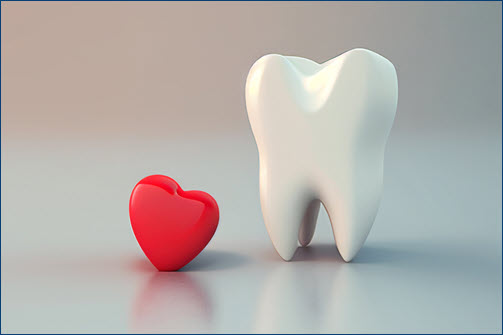Heart Health and Oral Health
Maintaining good oral health is about more than just having a bright smile; it plays a crucial role in your overall health, including the health of your heart. Numerous studies have highlighted a significant connection between oral health and cardiovascular health, suggesting that taking care of your teeth and gums can also protect your heart. Here’s a closer look at how these two aspects of health are connected and what you can do to maintain both.
Understanding the Link
 The connection between oral health and heart health is primarily due to the role of inflammation and bacteria. The mouth is a gateway to the body, and poor oral hygiene can lead to the buildup of bacteria and plaque. If not addressed, this can result in gum disease (periodontal disease), which is characterized by inflammation of the gums and the structures supporting the teeth.
The connection between oral health and heart health is primarily due to the role of inflammation and bacteria. The mouth is a gateway to the body, and poor oral hygiene can lead to the buildup of bacteria and plaque. If not addressed, this can result in gum disease (periodontal disease), which is characterized by inflammation of the gums and the structures supporting the teeth.
-
- Bacteria and Inflammation: When bacteria from the mouth enter the bloodstream, they can cause inflammation in other parts of the body, including the heart. This inflammation can lead to the development of atherosclerosis, a condition where plaque builds up in the arteries, increasing the risk of heart attack and stroke.
- Endocarditis: Oral bacteria can also cause endocarditis, an infection of the inner lining of the heart chambers and valves. This occurs when bacteria from the mouth spread through the bloodstream and attach to damaged areas of the heart.
- Shared Risk Factors: Poor oral health and cardiovascular disease share common risk factors, including smoking, poor nutrition, and diabetes. These factors can exacerbate both gum disease and heart disease, highlighting the need for comprehensive health management.
The Impact of Gum Disease on Heart Health
Gum disease is a significant risk factor for cardiovascular disease. Studies have shown that individuals with gum disease are more likely to develop heart disease compared to those with healthy gums. The inflammation caused by gum disease may increase the level of inflammation throughout the body, contributing to the development of cardiovascular problems.
Protecting Your Oral and Heart Health
Taking care of your oral health can have a positive impact on your heart health. Here are some steps you can take to protect both:
-
- Practice Good Oral Hygiene: Brush your teeth at least twice a day with fluoride toothpaste and floss daily to remove plaque and prevent gum disease.
- Visit Your Dentist Regularly: Regular dental check-ups and cleanings are essential for maintaining oral health and detecting any issues early on.
- Eat a Balanced Diet: A diet rich in fruits, vegetables, whole grains, and lean proteins supports both oral and cardiovascular health. Limit your intake of sugary and acidic foods that can contribute to tooth decay and inflammation.
- Quit Smoking: Smoking is a major risk factor for both gum disease and heart disease. Quitting smoking can significantly improve your oral and heart health.
- Manage Chronic Conditions: Conditions like diabetes can affect both oral and heart health. Work with your healthcare provider to manage any chronic conditions effectively.
The connection between oral health and heart health underscores the importance of a holistic approach to well-being. By maintaining good oral hygiene and addressing risk factors for cardiovascular disease, you can protect your overall health and reduce the risk of serious conditions. Regular dental visits, a healthy lifestyle, and awareness of the link between oral and heart health are key to promoting a healthier, happier life. Taking proactive steps today can lead to long-term benefits for your heart and your smile.



